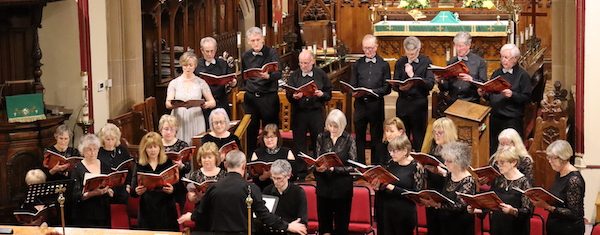for concert on Saturday 16th October at St Peter’s Church, Formby.
Mozart – Mass in C minor
It is both disappointing and poignant that Mozart did not actually complete his two greatest sacred works – the Requiem (the story of which is dramatised in the play and film Amadeus), and the C minor Mass. Obviously, Mozart’s untimely death prevented the completion of the Requiem, but the C minor Mass was hindered by Mozart’s move from working for the Archbishop of Salzburg and his marriage to Constanze Weber in 1782. When they travelled from Vienna to Salzburg in 1783, Mozart took the partial score with him, and apparently had every intention of completing it – but didn’t! If he had, it would have been a monumental composition comparable in scale to Bach’s B minor Mass.
Most of the Credo is missing, and it completely lacks the Agnus Dei, and significant gaps existed in the orchestration of the Credo and Sanctus. A number of editors have tried to provide completions of the work, but the edition we are using tonight (by Richard Maunder for Oxford University Press) merely fills the gaps in the orchestration and the Osanna which can be deduced from Mozart’s sketches – it does not attempt to provide new music for which Mozart left no clues.
What we do know is that it was first performed on 25th August 1783 in St Peter’s Church, Salzburg, and Constanze herself took one of the soprano solo parts. Presuming that this was a liturgical performance, in the context of a mass, it is not known whether the missing parts were completely omitted, spoken or sung to entirely different music.
Rutter – Feel the Spirit
The heritage of the African-American spiritual has been a source of inspiration for composers and performer for more than a hundred years. There have been many arrangements and interpretations, though rarely combining the forces of soloist, choir and orchestra. Feel the Spirit is a cycle of seven spirituals arranged by John Rutter. It was designed in collaboration with the mezzo soprano Melanie Marshall and first performed at the Carnegie Hall, New York in June 2001. Worked with Rutter’s hallmark craftsmanship, the cycle of seven spirituals is beautifully balanced as a whole, with each individual song being full of harmonic and rhythmic interest and excitement, and finished with sparkling orchestral colours providing interest throughout. Much of Rutter’s output has been sacred music, and although he claims to veer more towards being agnostic than Christian (“I’m more a fellow-traveller than a believer”), he also says about Christianity: “it’s given me my values and a strong sense of faith.”
